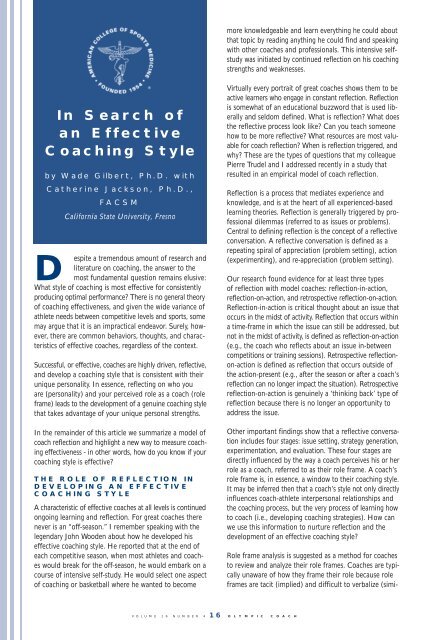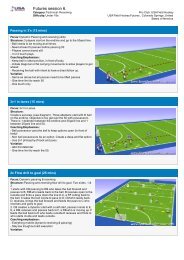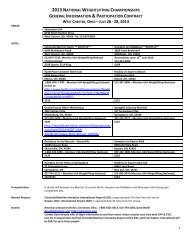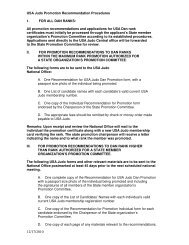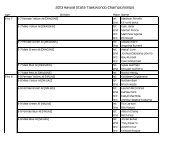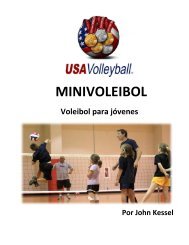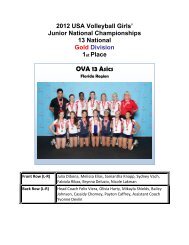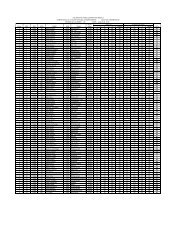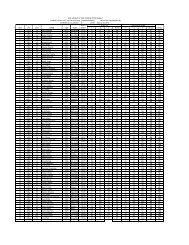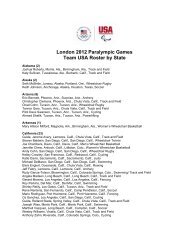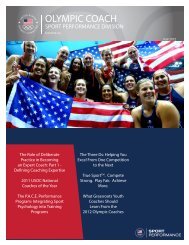OLYMPIC COACH - United States Olympic Committee
OLYMPIC COACH - United States Olympic Committee
OLYMPIC COACH - United States Olympic Committee
You also want an ePaper? Increase the reach of your titles
YUMPU automatically turns print PDFs into web optimized ePapers that Google loves.
In Search of<br />
an Effective<br />
Coaching Style<br />
by Wade Gilbert, Ph.D. with<br />
Catherine Jackson, Ph.D.,<br />
FACSM<br />
California State University, Fresno<br />
Despite a tremendous amount of research and<br />
literature on coaching, the answer to the<br />
most fundamental question remains elusive:<br />
What style of coaching is most effective for consistently<br />
producing optimal performance? There is no general theory<br />
of coaching effectiveness, and given the wide variance of<br />
athlete needs between competitive levels and sports, some<br />
may argue that it is an impractical endeavor. Surely, however,<br />
there are common behaviors, thoughts, and characteristics<br />
of effective coaches, regardless of the context.<br />
Successful, or effective, coaches are highly driven, reflective,<br />
and develop a coaching style that is consistent with their<br />
unique personality. In essence, reflecting on who you<br />
are (personality) and your perceived role as a coach (role<br />
frame) leads to the development of a genuine coaching style<br />
that takes advantage of your unique personal strengths.<br />
In the remainder of this article we summarize a model of<br />
coach reflection and highlight a new way to measure coaching<br />
effectiveness - in other words, how do you know if your<br />
coaching style is effective?<br />
THE ROLE OF REFLECTION IN<br />
DEVELOPING AN EFFECTIVE<br />
<strong>COACH</strong>ING STYLE<br />
A characteristic of effective coaches at all levels is continued<br />
ongoing learning and reflection. For great coaches there<br />
never is an “off-season.” I remember speaking with the<br />
legendary John Wooden about how he developed his<br />
effective coaching style. He reported that at the end of<br />
each competitive season, when most athletes and coaches<br />
would break for the off-season, he would embark on a<br />
course of intensive self-study. He would select one aspect<br />
of coaching or basketball where he wanted to become<br />
VOLUME 16 NUMBER 4 16 O L Y M P I C C O A C H<br />
more knowledgeable and learn everything he could about<br />
that topic by reading anything he could find and speaking<br />
with other coaches and professionals. This intensive selfstudy<br />
was initiated by continued reflection on his coaching<br />
strengths and weaknesses.<br />
Virtually every portrait of great coaches shows them to be<br />
active learners who engage in constant reflection. Reflection<br />
is somewhat of an educational buzzword that is used liberally<br />
and seldom defined. What is reflection? What does<br />
the reflective process look like? Can you teach someone<br />
how to be more reflective? What resources are most valuable<br />
for coach reflection? When is reflection triggered, and<br />
why? These are the types of questions that my colleague<br />
Pierre Trudel and I addressed recently in a study that<br />
resulted in an empirical model of coach reflection.<br />
Reflection is a process that mediates experience and<br />
knowledge, and is at the heart of all experienced-based<br />
learning theories. Reflection is generally triggered by professional<br />
dilemmas (referred to as issues or problems).<br />
Central to defining reflection is the concept of a reflective<br />
conversation. A reflective conversation is defined as a<br />
repeating spiral of appreciation (problem setting), action<br />
(experimenting), and re-appreciation (problem setting).<br />
Our research found evidence for at least three types<br />
of reflection with model coaches: reflection-in-action,<br />
reflection-on-action, and retrospective reflection-on-action.<br />
Reflection-in-action is critical thought about an issue that<br />
occurs in the midst of activity. Reflection that occurs within<br />
a time-frame in which the issue can still be addressed, but<br />
not in the midst of activity, is defined as reflection-on-action<br />
(e.g., the coach who reflects about an issue in-between<br />
competitions or training sessions). Retrospective reflectionon-action<br />
is defined as reflection that occurs outside of<br />
the action-present (e.g., after the season or after a coach’s<br />
reflection can no longer impact the situation). Retrospective<br />
reflection-on-action is genuinely a ‘thinking back’ type of<br />
reflection because there is no longer an opportunity to<br />
address the issue.<br />
Other important findings show that a reflective conversation<br />
includes four stages: issue setting, strategy generation,<br />
experimentation, and evaluation. These four stages are<br />
directly influenced by the way a coach perceives his or her<br />
role as a coach, referred to as their role frame. A coach’s<br />
role frame is, in essence, a window to their coaching style.<br />
It may be inferred then that a coach’s style not only directly<br />
influences coach-athlete interpersonal relationships and<br />
the coaching process, but the very process of learning how<br />
to coach (i.e., developing coaching strategies). How can<br />
we use this information to nurture reflection and the<br />
development of an effective coaching style?<br />
Role frame analysis is suggested as a method for coaches<br />
to review and analyze their role frames. Coaches are typically<br />
unaware of how they frame their role because role<br />
frames are tacit (implied) and difficult to verbalize (simi-


